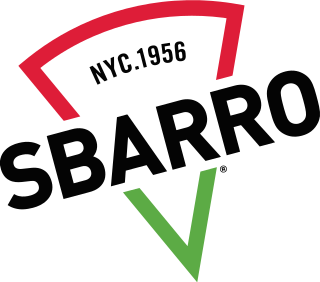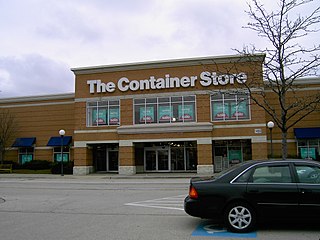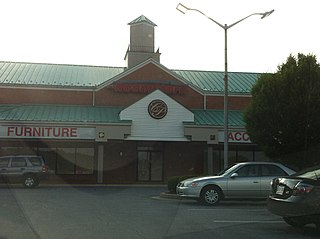
Macy's, Inc. is an American holding company of department stores. Upon its establishment in 1929, Federated held ownership of the regional department store chains Abraham & Straus, Lazarus, Filene's, and Shillito's. Bloomingdale's joined Federated Department Stores the next year. Throughout its early history, frequent acquisitions and divestitures saw the company operate a number of nameplates. In 1994, Federated took over the department store chain Macy's. Despite a long history of preserving regional nameplates, with the acquisition of The May Department Stores Company in 2005, they were retired and replaced by the Macy's and Bloomingdale's brands nationwide by 2006. Ultimately, Federated itself was renamed Macy's, Inc. in 2007.

Piggly Wiggly is an American supermarket chain operating in the American Southern and Midwestern regions run by Piggly Wiggly, LLC, an affiliate of C&S Wholesale Grocers. Its first outlet opened in 1916 in Memphis, Tennessee, and is notable as the first true self-service grocery store, and the originator of various familiar supermarket features, such as checkout stands, individual item price marking and shopping carts. The company headquarters is in Keene, New Hampshire. As of 2024, 503 independently owned Piggly Wiggly stores currently operate across 18 states, primarily in smaller cities and towns.

Big Lots Stores, Inc. is an American discount retail chain headquartered in Columbus, Ohio, United States.

Suncoast Motion Picture Company (Suncoast) is an American chain of retail stores specializing in new and used physical media, primarily CDs, DVDs, Blu-rays, and vinyl records, as well as collectibles.

Sbarro, LLC is an American fast food restaurant that specializes in New York–style pizza sold by the slice and other Italian-American cuisine. In 2011, the company was ranked 15th in foreign sales among U.S.-based quick-serve and fast-casual companies by QSR Magazine. In 2008, Sbarro was rated the No. 1 Quick Service Restaurant in the Italian segment by Entrepreneur magazine. However, diners and critics have criticized the quality of the food, with some suggesting a link between food quality and the company's two bankruptcies. Sbarro has over 600 locations in 28 countries. Sbarro stores are located in shopping malls, airports, service areas, and college campuses, as well as in The Pentagon, American naval bases, and casinos.

The Penn Traffic Company was a food service company founded in 1854 in Johnstown, Pennsylvania.

ALCO Stores, Inc. was a retail chain operating 198 stores in 23 states, primarily in the United States Midwest. The company was founded in 1901 in Kansas by Alva Lease Duckwall.

Associated Dry Goods Corporation (ADG) was a chain of department stores that merged with May Department Stores in 1986. It was founded in 1916 as an association of independent stores called American Dry Goods, based in New York City.

Value City Department Stores was an American department store chain with 113 locations. It was founded in 1917 by Ephraim Schottenstein, a travelling salesman in central Ohio. The store was an off-price retailer that sold clothing, jewelry, and home goods below the manufacturer suggested retail price. The chain focused on buyout and closeout merchandise, and occasionally irregular apparel and factory seconds. The stores were branded Schottenstein's in the Columbus, Ohio, market. The Schottenstein name was dropped in 2008. Also, three stores in Metro Detroit were co-branded as Crowley's Value City. From 1984 to 1995, Schottenstein also owned Shifrin-Willens, a jewelry store.
Lamonts was a chain of department stores founded in Seattle, Washington. The chain was started in 1970 when Pay 'n Save renamed its suburban branches of Rhodes, a department store chain the company acquired in 1965. Lamonts remained a division of Pay 'n Save until 1985. During the 1990s, the chain filed for bankruptcy twice and closed several stores before being sold to Gottschalks in 2000. Gottschalks itself went into bankruptcy and liquidated in 2009.

The Elder-Beerman Stores Corp., commonly known as Elder-Beerman, was an American chain of department stores founded in 1883 and whose last stores closed in 2018. The chain, based primarily in the Midwestern United States, was composed of 31 stores in eight states at the time of its liquidation in 2018, and peaked around 2003 with 68 stores and $670 million in annual sales.

The Container Store Group, Inc. is an American specialty retail chain company that operates The Container Store, which offers storage and organization products, and custom closets. In February 2007, its owners announced that they were "exploring alternatives," including selling The Container Store to private investors, in order to fund future growth. They stated that they would not sell unless they received guarantees that the corporate culture would be preserved. On July 2, 2007, The Container Store announced that they had closed a deal with a private equity firm based in Los Angeles, Leonard Green & Partners, which obtained a majority stake.

Fresh & Easy Neighborhood Market was a chain of grocery stores in the Western United States, headquartered in El Segundo, California. It was a subsidiary of Tesco, the world's third largest retailer, based in the United Kingdom, until November 2013 when it was purchased by Yucaipa Companies. It had plans for rapid growth – the first stores opened in November 2007 and, after a pause in the second quarter of 2008, the opening program recommenced. While there were over 200 stores in Arizona, California, and Nevada by December 2012, Tesco confirmed in April 2013 that it was pulling out of the US market, at a reported cost of £1.2 billion. On September 10, 2013, Tesco announced they were transferring ownership and operations of more than 150 stores to supermarket-owner Ron Burkle's Yucaipa Companies group. At the beginning of October 2013, Fresh & Easy filed for Chapter 11 bankruptcy in U.S. bankruptcy court. The sale cost Tesco £150m, taking the total cost of its failed US venture to nearly £2bn. On October 23, 2015, Yucaipa announced that it would close all Fresh & Easy stores.

Charlotte Russe Inc. is an American clothing retail chain store that operates in the United States, headquartered in Toronto, Canada. Fashions in the stores are targeted at women in their teens and twenties. As of September 2023, Charlotte Russe operates 196 stores, mostly in malls and shopping centers.

The Room Store was a chain of furniture retail stores in the eastern and southern United States, which operated from 1992 to 2012. The company, which was owned by RoomStore, Inc., specialized in retailing all the pieces of furniture for an entire room rather than individual pieces of furniture. For example, a table may have been sold with chairs and other dining room accessories in a package rather than a table alone. The Room Store was ranked as one of the top 25 furniture retailers in the United States. A similar chain with the same name operated stores in Arizona from 1993 to 2016.

Christopher & Banks, originally known as Brauns Fashions, is an American retail company. Originally headquartered in the Minneapolis suburb of Plymouth, Minnesota, the chain specializes in women's clothing for the age 40-60 demographic.
Storables is a specialty retail chain that carries a variety of products aimed at helping consumers organize their homes and work spaces in the West Coast of the United States. Its products are categorized into departments including Audio, Baskets, Bath, Closets, Furniture, Kids, Kitchen, Laundry, Novelty, Office, and Utility. The company's motto is "Make Room for Living."
Hold Everything was a specialty retail chain in the United States that sold home organization and storage solutions. Its parent company, Williams-Sonoma, Inc., closed the chain's 11 existing stores in 2006.
Sears Holdings Corporation was an American holding company headquartered in Hoffman Estates, Illinois. It was the parent company of the chain stores Kmart and Sears and was founded after the former purchased the latter in 2005. It was the 20th-largest retailing company in the United States in 2015. It filed for Chapter 11 bankruptcy on October 15, 2018, and sold its assets to ESL Investments in 2019. The new owner moved Sears assets to its newly formed subsidiary Transformco and after that, Sears Holdings Corporation was closed.















